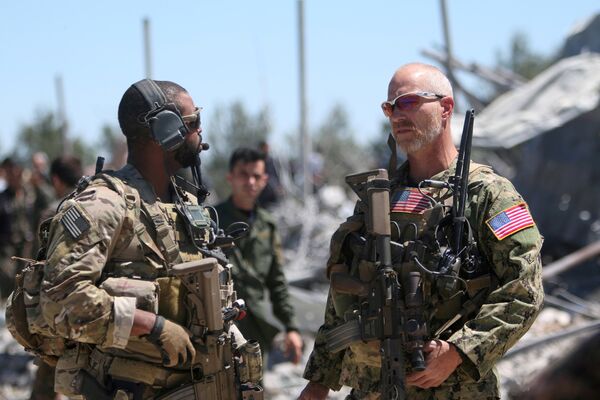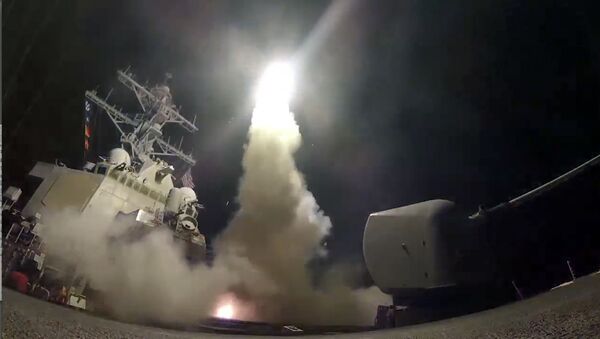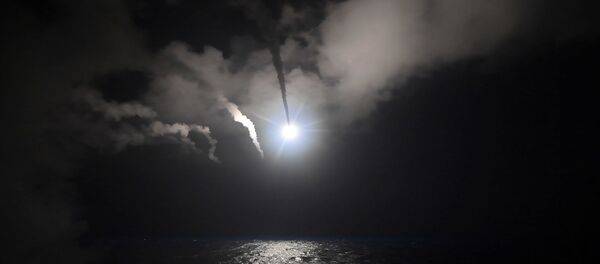The Syrian Arab Army's military successes do not fit into the plans of the US military-industrial complex, Vladimir Sotnikov, a senior researcher at the Institute of Oriental Studies of the Russian Academy of Sciences (RAS), notes, highlighting that US Donald Trump largely relies on the support of these influential circles.
According to Sotnikov, President Trump is doomed to take heed of the stance of the US military-industrial circles "to which he has remained indebted since he was elected."
Likewise, the US' strike on the Syrian Arab Army's Shayrat airfield on April 7, which came as a "response" to the April 4 chemical incident in Idlib, was nothing but a demonstration of the White House's readiness to use the military option, the scholar stressed.
On April 4, the National Coalition for Syrian Revolutionary and Opposition Forces backed by the United States blamed the Syrian Arab Army (SAA) for the supposed chemical attack in Khan Shaykhun in Syria's Idlib province.
Before any investigation into the issue was conducted, Washington launched 59 Tomahawk cruise missiles at the Syrian governmental military airfield near the village of Shayrat on April 7 as a "retaliatory" measure.
"Military successes of the [Syrian Arab Republic's] government forces in the fight against… Daesh [ISIS/ISIL] do not work for the circles that Trump is relying on," Sotnikov stressed, adding that although it's not being stated openly, it is clear that Washington's stance towards Damascus has not changed with Trump's taking office.

"They do not want to see [Syrian President Assad] in power," the scholar stressed.
The White House's statement on the Syrian Arab Army's alleged preparation for "yet another" chemical strike prompted deep concerns among Russian observers and politicians.
Referring to the fact that the Trump administration has not presented any evidence to back its claims, they suggested that Washington is mulling over a new attack against the SAA.
"The US is preparing a new attack on the positions of the Syrian troops, this is clear. A new cynical and unprecedented provocation is being prepared," First Deputy Chairman of the Federation Council Committee on Defense and Security Frants Klintsevich suggested.
Commenting on the reported deployment, Russian Senator Alexei Pushkov assumed that Washington is ready to strike Syria and is just waiting for a pretext. According to the lawmaker, any staged provocation could become the trigger for a strike.
"The United States put its Navy and Air Force on alert, and is just waiting for an excuse to strike Syria. Assad will not give them one. This is the perfect time for a provocation," Pushkov tweeted.
США привели в готовность силы ВМФ и ВВС и ждут лишь предлога для удара по Сирии. Асад им предлога не даст. Идеальное время для провокации.
— Алексей Пушков (@Alexey_Pushkov) 28 июня 2017 г.
On Thursday, during a weekly briefing Russian Foreign Ministry spokeswoman Maria Zakharova revealed that Moscow had new intelligence on preparations for staged provocations in Syria.
Zakharova named the towns of Saraqib and Ariha in northwest Idlib province as the possible locations where such provocations could take place.
Meanwhile, on Wednesday, US Defense Secretary Jim Mattis announced that the Syrian government appeared to have heeded Washington's warning and therefore aborted a chemical attack.
"It appears that they took the warning seriously. They didn't do it," Mattis said, as quoted by Reuters.
"He [Mattis] offered no evidence other than the fact that an attack had not taken place," the media outlet remarked.
The recent article by American investigative journalist Seymour Hersh for Welt Am Sonntag indicated that the White House's Syrian chemical weapons narrative is profoundly flawed.
According to the Pulitzer-Prize winning reporter, the US military on the ground in Syria knew that the Syrian Arab Army didn't conduct any sort of chemical attack in Khan Shaykhun on April 4, 2017.



